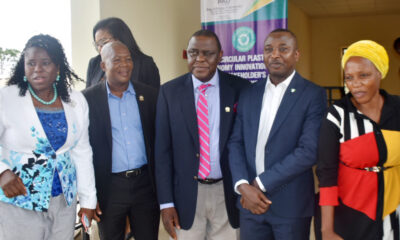Ict/Telecom
ICT: S’Korea Aims For Ubiquitous Status
South Korea aims to become a “ubiquitous society,” following its fast changing world of ICT, Prof. Ki-Shik Park, the Chairman, Operating Committee of Ubiquitous IT Korea Forum, said.
Park disclosed the plan in a lecture on “Recent Trends and Changes in ICT” which he delivered to some 20 Nigerians participating in an e-government training in South Korea.
He said that the recent trends in ICT had brought about changes in computing environments of the world.
He also said that South Korea, having passed the agrarian and industrial age, and enjoying a robust “Big Age of ICT, aims to be in ubiquitous age in the nearest future”.
“ICT is becoming ubiquitous, especially in the Asia-Pacific region, while there is an increase in the availability and diffusion of wireless broadband and the use of mobile technologies in other regions.
“The upper middle and high income countries of the world are fast adopting the wonders of IT, while the lower middle and lower income countries lag behind, though this is expected to change in the next few years.’’
The Electronics and Telecommunication Resource Institute (ETRI) fellow said that the world’s information main frame of the 1980s where many persons used one computer shifted to one person/one computer usage in the 1990s.
“And we are now in ubiquitous 21st century, with one person having many computers and smart gadgets and widespread use of the Internet.
“Just by walking down the street, you can be subjected to a personal bio-metric system.
“You can be scanned by the gateway of the transit system because there will be something embedded in the street or in the flooring beneath you.
“You can also be touching other tangible interfaces in the environment around you and the lamp posts and other features of the street scape can have informational service.
“And a robotic helicopter surveying the cityscape and communicating with all of these devices,” Park, who is also the President of Policy Studies Association for Human Dignity, said.
He said this might seem to be distant vision, but that the scenario “is just around the corner” adding that presently in South Korea an entire city was being built that would have these features.
“Several other countries are currently planning and building cities modelled around South Korea’s U-city.”
“It is a future world filled with wonders, where today’s possibilities become tomorrow’s reality,” Park said
Ict/Telecom
Technology, Others Responsible For Nigeria’s Bonga Oil Operations
The Managing Director, Shell Nigeria Exploration and Company Limited (SNEPCo), Elohor Aiboni, said Bonga, Nigeria’s first deep-water asset, has recorded major milestones, due to effective leadership, cutting-edge technology, continuous improvement and collaboration with stakeholders.
She noted that since coming on stream in November 2005, Bonga has maintained a track record of production that saw it achieve one-billion-barrel export on February 13, last year.
In her presentation, titled “The Bonga Journey to a Billion Barrels”, at the ongoing 2024 Offshore Technology Conference in Houston, Texas, United States, Aiboni, said: “SNEPCo is grateful for the contributions of all the parties to the Bonga story and we can all be proud of the milestones.
“Bonga has been consistent. In 2014, nine years after coming onstream, it achieved half a billion barrels of crude and doubled it in 2023. We have worked relentlessly to ensure excellent asset management, project and wells delivery and deployment of technology and innovations in our operations”.
According to her, these factors, “coupled with the supportive partnership of the Nigerian National Petroleum Company Limited and our co-venturers – TotalEnergies, EP Nigeria Limited; Nigerian Agip Exploration; and Esso Exploration and Production Nigeria Limited, make Bonga stand out as a world-class investment case”.
She continued that, “SNEPCo also enjoyed the support of the Nigerian Upstream Petroleum Regulatory Commission (NUPRC) and the Nigerian Content Development and Monitoring Board (NCDMB) in the success of Bonga operations”.
Aiboni also listed the challenges of keeping the Bonga Floating Production, Storage and Offloading vessel full as the asset ages and dealing with unexpected developments with subsea wells and equipment.
She said: “SNEPCo responded with a campaign of operational excellence, which among other initiatives, led to the creation of a programme known as the Bonga Business Improvement Plan that continually reviews and identifies improvement initiatives and drives sustainability in operations and upskilling of staff.
“The Bonga success story has been led by Nigerians who have been managing directors of SNEPCo since it was established in 1993, in a deliberate policy by Shell to develop indigenous manpower for deep-water operations in Nigeria.
“Today, some 97percent of the SNEPCo workforce is Nigerian and overall, Bonga has helped to create a new generation of Nigerian deep-water professionals.
“Our vision at SNEPCo remains to be the best deep-water business, powering growth and achieving net zero emissions in line with Shell’s Powering Progress strategy”.
Ict/Telecom
Banks Cut Borrowing From CBN By 44%
Banks’ borrowings from the Central Bank of Nigeria (CBN) fell month-on-month, (MoM) by 44 percent to N12.16 trillion in April from N21.7 trillion in March.
Analysis of latest data from the CBN shows that the 44percent drop represents the first MoM decline in banks borrowing from since January when it increased by 268.7 percent to N3.6 trillion from N976.29 billion in December 2023.
However, further analysis showed that banks’ deposits in the CBN SDF grew MoM by 118.4 percent to N428.97 billion in April from N196.37 billion in March 2024.
Banks make use of the SLF to access liquidity to run their day-to-day business operations while the Standing Deposit Facility window (SDF) on the other hand, is an overnight deposit facility that allows banks to lodge excess liquidity (money) with the CBN and earn interest.
The decline in banks’ borrowing from SLF may reflect an increase in banking system liquidity and also the decision of the apex bank last year to remove the limit on the remunerable daily placements by banks at the SDF.
According to the CBN Governor, Mr. Olayemi Cardoso, the CBN removed the cap on the remunerable SDF to increase activity in the SDF window and manage liquidity.
Ict/Telecom
Expert Highlights Technology Impact On Fintech Industry Growth
A Financial technology expert, Olatunji Akinrinola, has highlighted the exponential growth of the FinTech industry, which according to him, was driven by technological advancements.
Akinrinola made this assertion in a press release recently, where he stressed that the role of technology in driving this exponential growth in the FinTech sector was very outstanding.
According to him, Technology has revolutionised the way financial services are delivered, making them more accessible, efficient, and inclusive.
“Through innovations such as mobile banking, digital payments, and blockchain technology, FinTech companies have been able to reach a larger population and provided them with access to financial services”, he stated.
Akinrinola emphasised the role of technology in enabling financial inclusion, adding: “Technology has democratised access to financial services, particularly in regions with limited banking infrastructure.
“Mobile money platforms and digital wallets have empowered individuals to conduct financial transactions conveniently and securely, without the need for traditional banking services”.
He also underscored the role of Artificial Intelligence (AI) and data analytics in driving innovation within the FinTech industry, noting: “AI-powered algorithms and predictive analytics have revolutionised risk assessment, fraud detection, and customer personalisation in financial services.
“These technologies enable FinTech companies to provide tailored solutions and mitigate risks more effectively, ultimately enhancing the overall customer experience”.
Akinrinola stressed the importance of regulatory frameworks in fostering the growth of the FinTech industry.
“While technology has accelerated the growth of FinTech, it is essential to establish robust regulatory frameworks to ensure consumer protection and maintain market stability. Regulators play a crucial role in balancing innovation with risk management, thereby creating a conducive environment for the sustainable growth of the FinTech sector”, he stated.
Akinrinola underscored the role of technology in driving the exponential growth of the FinTech industry, saying, “Technology has been a game-changer for the FinTech sector, enabling innovation, expanding access to financial services, and driving economic growth.
“As technology continues to evolve, the FinTech industry will undoubtedly play a significant role in shaping the future of financial services ecosystem”.
Corlins Walter
-
Politics3 days ago
Bayelsa PDP Crisis Deepens As Factional CTC Sacks Party Management Structure
-
Niger Delta3 days ago
Health Professions Not Superior To Others – Bayelsa Dep Gov
-

 Nation3 days ago
Nation3 days agoCBEX Resumes Operations Despite SEC Ban, N1.2trn EFCC Probe
-
Women3 days ago
Justice Prevails Over Osinachi’s Death
-

 Rivers3 days ago
Rivers3 days agoBook Title “Managing Projects Successfully” Launch In Port Harcourt
-
Politics3 days ago
Enugu LP Loses Pub Sec To PDP
-
Niger Delta3 days ago
Diri Recommits To Support For Security Agencies …Cautions AIG, Sacks Youth Exco
-

 Nation3 days ago
Nation3 days agoOgun, Nike Art Gallery Set To Transform Olumo Rock

